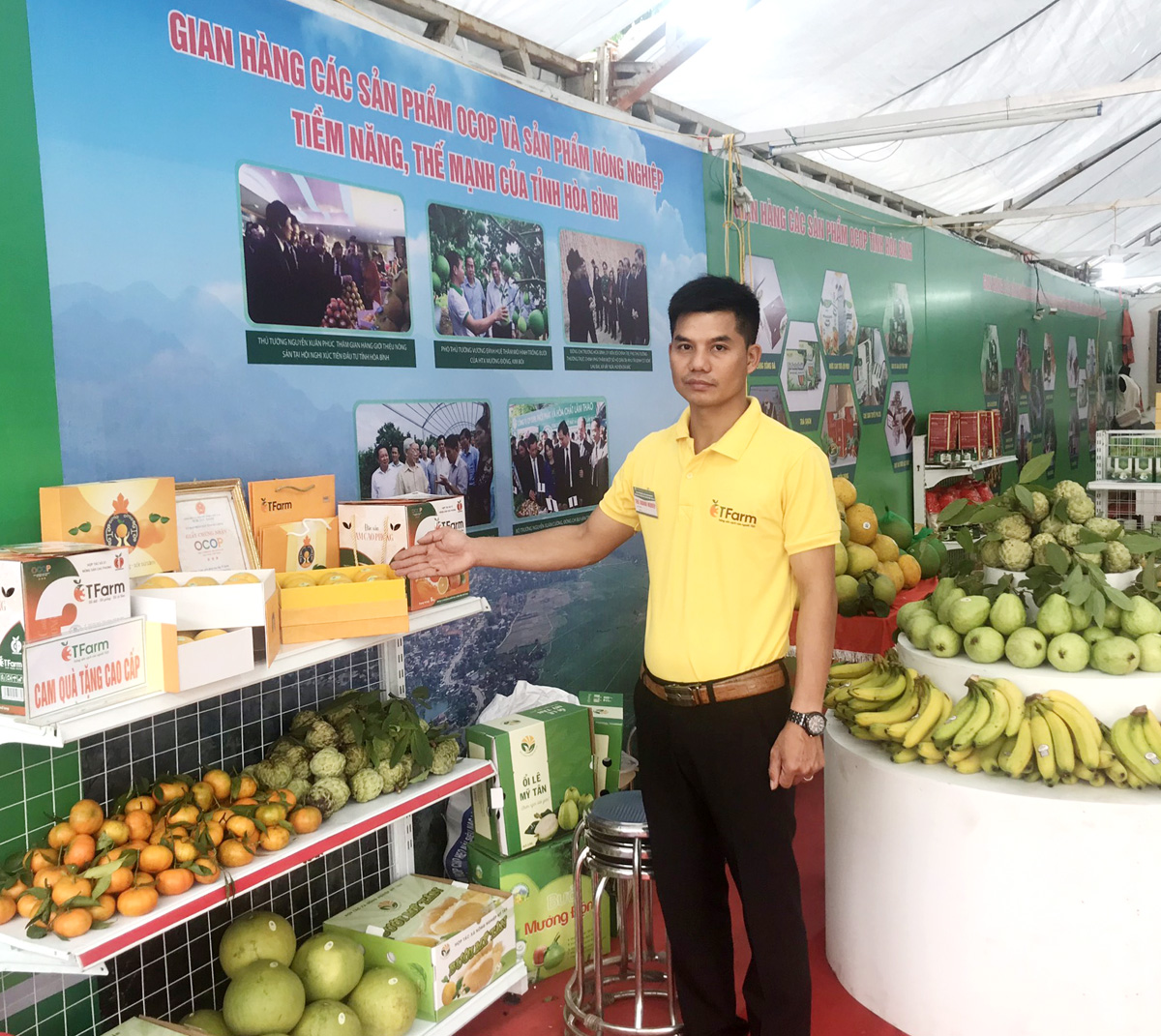
(HBO) - Last year, 27 products were recognised by the Hoa Binh People’s Committee as meeting criteria of the One Commune, One Product (OCOP) programme. With a target of building brands for OCOP products, in 2020, Hoa Binh authorities have taken part in and arranged various trade promotions to introduce those products. Departments, sectors and localities also launched shops displaying and selling OCOP products.
 OCOP products of Hoa Binh province at the
Agricultural and OCOP Fair in the northern midland and mountainous region and the
Cao Phong orange week in 2020.
OCOP products of Hoa Binh province at the
Agricultural and OCOP Fair in the northern midland and mountainous region and the
Cao Phong orange week in 2020.
joining the programme,
local businesses will enjoy optimal conditions to devise high quality products
raking in high economic value, seek partners, and expand markets.
Some popular OCOP
products include banana of viba banana cooperative; high quality orange of Cao
Phong farm produce 3T cooperative; fermented orange juice, orange flesh jam and
juice of Ha Phong cooperative; and whole poultry of Lac Thuy chicken
cooperative, among others.
This year, the provincial
Department of Agriculture and Rural Development teamed up with other
departments, sectors and localities to hold numerous promotions. They were the
northern region’s industrial and farm produce fair, the Agricultural and OCOP
Fair in the northern midland and mountainous region and the Cao Phong orange
week in 2020.
The events offered
chances for businesses to connect and share experience with consumers and
distributors towards the development of the OCOP programme, in a bid to help them
secure contracts of shipping products to consumers.
The Agricultural and
OCOP Fair in the northern midland and mountainous region and the Cao Phong
orange week in 2020 attracted a large number of visitors. Nguyen Thi Van, a
resident of Hanoi, said most of OCOP products are nice-looking and she can be
assured about their origin and quality.
In addition to holding
and participating in trade promotions, Hoa Binh authorities have paid attention
to the sales of OCOP products in other localities./.
According to data from the Hoa Binh Provincial Party Committee, the industrial production index for the first six months of 2025 is estimated to have increased by 20% compared to the same period last year. This marks the highest year-on-year growth rate for this period since 2020.
In the first six months of 2025, Hoa Binh province’s export turnover was estimated at 1.145 billion USD, marking an 18.11% increase compared to the same period in 2024. Import turnover was estimated at $ 804 million, a 17.15% increase, which helped the province maintain a positive trade balance.
The lives of the ethnic minority farmers in Tan Lac district have gradually improved thanks to the new directions in agricultural production. This is a testament to the collective strength fostered through the professional associations and groups implemented by various levels of the district’s Farmers’ Union.
With the motto the "product quality comes first,” after nearly one year of establishment and operation, Muong village’s Clean Food Agricultural and Commercial Cooperative, located in Cau Hamlet, Hung Son Commune (Kim Boi district), has launched reputable, high-quality agricultural products to the market that are well-received by consumers. The products such as Muong village’s pork sausage, salt-cured chicken, and salt-cured pork hocks have gradually carved out a place in the market and they are on the path to obtaining the OCOP certification.
In the past, the phrase "bumper harvest, rock-bottom prices" was a familiar refrain for Vietnamese farmers engaged in fragmented, small-scale agriculture. But today, a new spirit is emerging across rural areas of Hoa Binh province - one of collaboration, organisation, and collective economic models that provide a stable foundation for production.
Maintaining growing area codes and packing facility codes in accordance with regulations is a mandatory requirement for agricultural products to be eligible for export. Recently, the Department of Agriculture and Environment of Hoa Binh province has intensified technical supervision of designated farming areas and packing facilities to safeguard the "green passport" that enables its products to access international markets.



 OCOP products of Hoa Binh province at the
Agricultural and OCOP Fair in the northern midland and mountainous region and the
Cao Phong orange week in 2020.
OCOP products of Hoa Binh province at the
Agricultural and OCOP Fair in the northern midland and mountainous region and the
Cao Phong orange week in 2020.